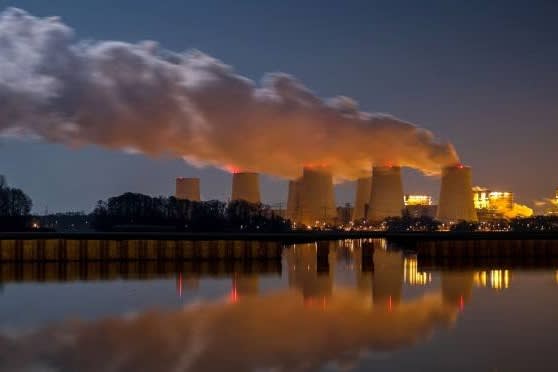Brazil’s new environment minister faces huge Amazon challenge
Activists hope the appointment of a new environment minister in Brazil signals a change of direction for a government that has downplayed climate change and presided over a massive increase in deforestation in the Amazon rainforest.
Joaquim Pereira Leite, virtually unknown just months ago, now has one of the most important posts in climate politics. The 46-year-old has the task of saving the Amazon at a time when the vital ecosystem is imperilled by escalating climate change and human-led deforestation.
The destruction of the biome is no longer a distant prospect. Its impact is already being felt as Brazil is hit by severe drought, and scientists warn that further deforestation will have an even more devastating effect on Latin America and the world.
Leite’s predecessor, Ricardo Salles, derided by critics as the “anti-environment minister”, advocated opening up the rainforest to commercial activity and quit in June amid allegations, which he denies, that he had colluded with illegal loggers.
Now activists hope Leite’s appointment will herald a new approach by the Brazilian government to climate change.
“I believe Leite is much less ideologically charged than Salles. He might be more technical and less likely to get into controversies,” said Raoni Rajão, a prominent environmental academic at the Federal University of Minas Gerais.
Environmentalists warn, however, that Leite’s ability to reorient Brazil’s stance on the environment will be limited by President Jair Bolsonaro, who has little interest in preservation and counts the rainforest’s legions of illegal gold miners, loggers and ranchers among his core voter base.
“One thing we have to be clear about is that Ricardo Salles was an operator for President Jair Bolsonaro. So the current minister, if he wants to do anything, he is going to have to stop listening to the president,” said Marina Silva, a former environment minister under the leftwing Workers’ party government.
Bolsonaro has not spoken publicly about Leite, who was a coffee producer and agricultural adviser for years before joining the ministry in senior roles in 2019. His appointment as minister was announced in a brief statement, simply saying: “He will know how to advance even further in the improvement of environmental issues in Brazil, the greatest agro-environmental power on the planet.”
Suely Araújo, a former president of Ibama, Brazil’s main environmental enforcement agency, acknowledged Leite was “less noisy” than Salles, but cautioned over his historic ties to what she calls “the most archaic part of agriculture”.
“If [Leite] was going to promote structural changes, we would already be hearing about the proposals. The impression I have is that he will continue with the government’s current agenda.
“To remain in the government, the minister has to remain faithful to what is being done. The environmental dismantling project comes from President Bolsonaro,” she added.
Deforestation has surged since the rightwing leader came to power in 2019. Last year more than 11,000 sq km of the Amazon rainforest was razed, an area seven times the size of London and the highest rate in 12 years.
The number of fires — a big source of carbon emissions — has also increased, with the Latin American nation reporting in June the highest number of blazes for that month in 14 years. At the same time, the Brazilian government has slashed the budgets of its environmental agencies, such as Ibama, which work to preserve forests and national parks.
Teresa Vendramini, director of the Brazilian Rural Society, an agricultural association where Leite worked as an adviser for 20 years before joining the ministry, said the new minister’s biggest challenge was tackling illegal deforestation, loggers and land grabbers. “But we are learning that doesn’t just depend on the ministry but also on Ibama, federal police, everybody.”
Deforestation is typically driven by myriad networks of illegal interests, including loggers, wildcat gold miners, ranchers and even criminal syndicates. Fires are typically set in order to clear land after an area of forest has been felled.
Fires can also be caused by drought. A study last month by the universities of Oxford and Lancaster found that drought and wildfires following the 2015-16 El Niño weather event destroyed more than 2.5bn trees and woody vines in the most affected area of the rainforest.
Scientists now fear that increasingly severe climate change will combine with human-led deforestation to push the rainforest past its “tipping point,” where it can no longer sustain its water-recycling ecosystem. This would cause the forest to quickly die and trigger severe climate fluctuations in Latin America and around the world.
“Leite’s first big challenge is to fight deforestation — it is his biggest responsibility. Our last minister paid almost no attention to it,” said André Guimarães, director of the Amazon Environmental Research Institute.
Leite, who joined the environment ministry in its forestry department before heading the Amazon secretariat, declined requests for an interview and has remained mostly quiet on the challenges that Brazil faces in the rainforest.
In public comments last month, however, he highlighted the importance of “working together . . . to integrate the [armed] forces of the ministry of defence and the ministry of justice and public security to combat illegal deforestation and illegal mining”.
In July, the Brazilian government redeployed the military to crack down on deforestation. The mission follows a previous two-year long deployment by the armed forces in the Amazon, which was widely deemed a failure as it did not stop deforestation from increasing.
Observers of that mission — codenamed Green Brazil — said the military was not nimble enough to catch highly mobile bands of loggers and miners who are well adapted to the forest’s climate and terrain.
Additional reporting by Carolina Pulice
Climate Capital

Where climate change meets business, markets and politics. Explore the FT’s coverage here.
Are you curious about the FT’s environmental sustainability commitments? Find out more about our science-based targets here
